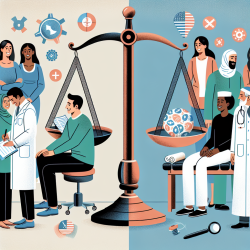The field of chiropractic care has traditionally focused on the biological aspects of spine-related disorders (SRDs). However, recent research underscores the importance of integrating psychosocial factors into chiropractic education and practice. The study "The prevalence of psychosocial related terminology in chiropractic program courses, chiropractic accreditation standards, and chiropractic examining board testing content in the United States" provides valuable insights into this area.
The Research Findings
The study examined the use of psychosocial-related terminology in U.S. chiropractic programs, accreditation standards, and board exams. The findings reveal that terms like "public" and "behavior" are infrequently used, suggesting a limited emphasis on psychosocial factors in the curriculum.
Why Psychosocial Factors Matter
Psychosocial factors, including mental health, social environment, and emotional well-being, significantly influence the trajectory of SRDs. Ignoring these factors can lead to incomplete patient care and suboptimal outcomes. Incorporating a biopsychosocial (BPS) model into chiropractic practice can enhance patient management by addressing the full spectrum of factors affecting health.
Implementing Research Outcomes
Chiropractic practitioners can take several steps to integrate psychosocial awareness into their practice:
- Continuing Education: Engage in courses and workshops that focus on the BPS model and psychosocial determinants of health.
- Patient Assessments: Include questions about mental health, social support, and emotional well-being in patient intake forms.
- Interdisciplinary Collaboration: Work with psychologists, social workers, and other healthcare providers to address the psychosocial aspects of patient care.
- Advocacy: Advocate for curriculum changes that emphasize the importance of psychosocial factors in chiropractic education.
Encouraging Further Research
While the study highlights gaps in current chiropractic education, it also opens avenues for further research. Practitioners and educators are encouraged to:
- Conduct Studies: Investigate the impact of integrating psychosocial factors into chiropractic practice on patient outcomes.
- Curriculum Development: Develop and test new educational modules that incorporate psychosocial elements.
- Policy Advocacy: Advocate for changes in accreditation standards to ensure a comprehensive approach to chiropractic education.
To read the original research paper, please follow this link:
The prevalence of psychosocial related terminology in chiropractic program courses, chiropractic accreditation standards, and chiropractic examining board testing content in the United States.










